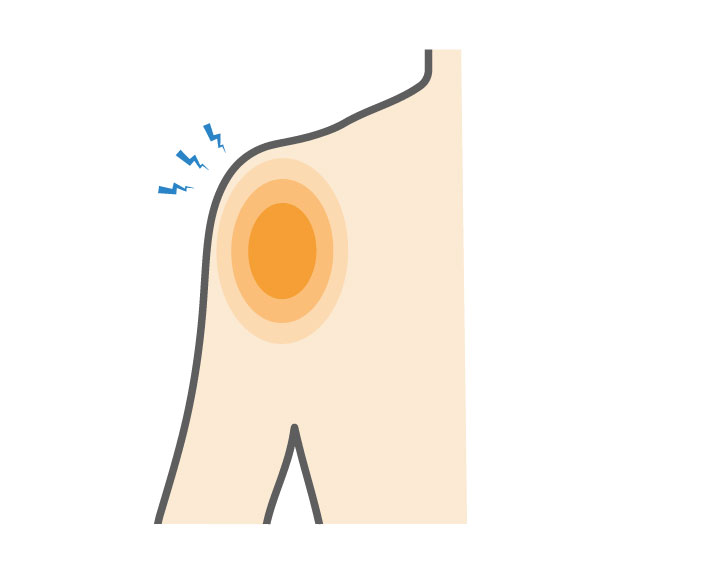A shoulder contusion, or bruising of the shoulder muscle, is a mild sports injury that can occur due to a direct blow or a fall. The muscle may be stretched — though it doesn’t tear — and you may have visible bruising just below the skin as well as deeper bruising. While a shoulder contusion is uncomfortable and may temporarily make it difficult to move your arm normally, it’s an injury that typically resolves quickly.
Shoulder Contusion Causes, Symptoms & Treatment Options
A shoulder contusion, or bruising of the shoulder muscle, is a mild sports injury that can occur due to a direct blow or a fall. The muscle may be stretched, though it doesn’t tear, and you may have visible bruising just below the skin as well as deeper bruising. While a shoulder contusion is uncomfortable and may temporarily make it difficult to move your arm normally, it’s an injury that typically resolves quickly.
Overview
Overview

What causes Shoulder Contusion?
A shoulder contusion usually results from a fall or a direct blow to the shoulder. Any blunt force injury on the shoulder with sufficient force to propel its energy into the muscle can cause a contusion. Contusions are often the result of impact injuries related to sports or accidents. Shoulder contusions are common in these sports:
- Football
- Rugby
- Lacrosse
- Soccer
- Baseball
- Basketball
Symptoms
If you have a shoulder contusion, you may have these symptoms:
- Pain around the shoulder joint
- Ecchymoses, or ‘black and blue’ shoulder bruising or redness
- Swelling in the shoulder area
If you have a shoulder contusion, you are usually able to raise your arm, but may have some discomfort.
When to see a doctor
Although a shoulder contusion doesn’t usually require medical treatment, you may need to see your doctor to make sure that you don’t have a more serious injury. Make an appointment if you fall on your shoulder and have swelling and pain that gets worse instead of better, have a lot of shoulder bruising, or have trouble moving your arm or hand. In some cases, hand contusions may occur simultaneously due to bracing during a fall. Your doctor will ask you about your injury and your symptoms and examine your arm. In order to rule out another injury, your doctor may order an X-ray or MRI to get a better look at the bones and soft tissues of your shoulder.
Non-operative treatment
Shoulder contusions are always treated nonoperatively. Conservative treatments include:
- Rest, including taking a break from play and avoiding heavy lifting
- Using a sling to rest your shoulder, if recommended by your doctor
- Icing your shoulder (every one to two hours for 20 minutes) – The general recommendation is to avoid heat during the first 24–48 hours to avoid increasing the extent of bleeding and swelling.
- Over-the-counter pain medication, like ibuprofen or acetaminophen, if needed
Severe contusions are often treated by a Physical Therapist or an Athletic Trainer. They are often the best people to advise you on when it is safe to return to your sport.
Recovery
After a shoulder contusion, you may be able to restart normal activities after just a few days, though more severe contusions may require several weeks of resting your shoulder. You should start stretching exercises within a few days of your injury and progress to strengthening and weight-bearing shoulder exercises, under the guidance of your doctor or physical therapist. You can return to play once you’ve regained your full range of motion and strength in the shoulder.
GET BACK TO WHAT YOU LOVE. FASTER
Sources
Frequently Asked Questions
How do I know if it’s a contusion or a fracture?
A contusion usually shows bruising and swelling without deformity. If you experience severe pain, inability to move the arm, or hear a crack at the time of injury, seek medical imaging to rule out fractures.
Can I continue daily activities if my elbow hurts from repetitive strain?
It’s usually okay to keep doing light activities, but avoid anything that triggers sharp pain or worsens symptoms. Pushing through pain can make the injury worse, so listen to your body and give it rest when needed.
Can a contusion lead to permanent damage?
Rarely. Most shoulder contusions heal fully, especially with proper treatment. However, failure to rest or manage a severe impact injury could cause shoulder stiffness and possibly a frozen shoulder.
How do I reduce swelling from a shoulder contusion quickly?
Apply ice for 20-minute intervals every couple of hours for the first 48 hours. Avoid heat early on, and begin gentle range of motion exercises as tolerated.

